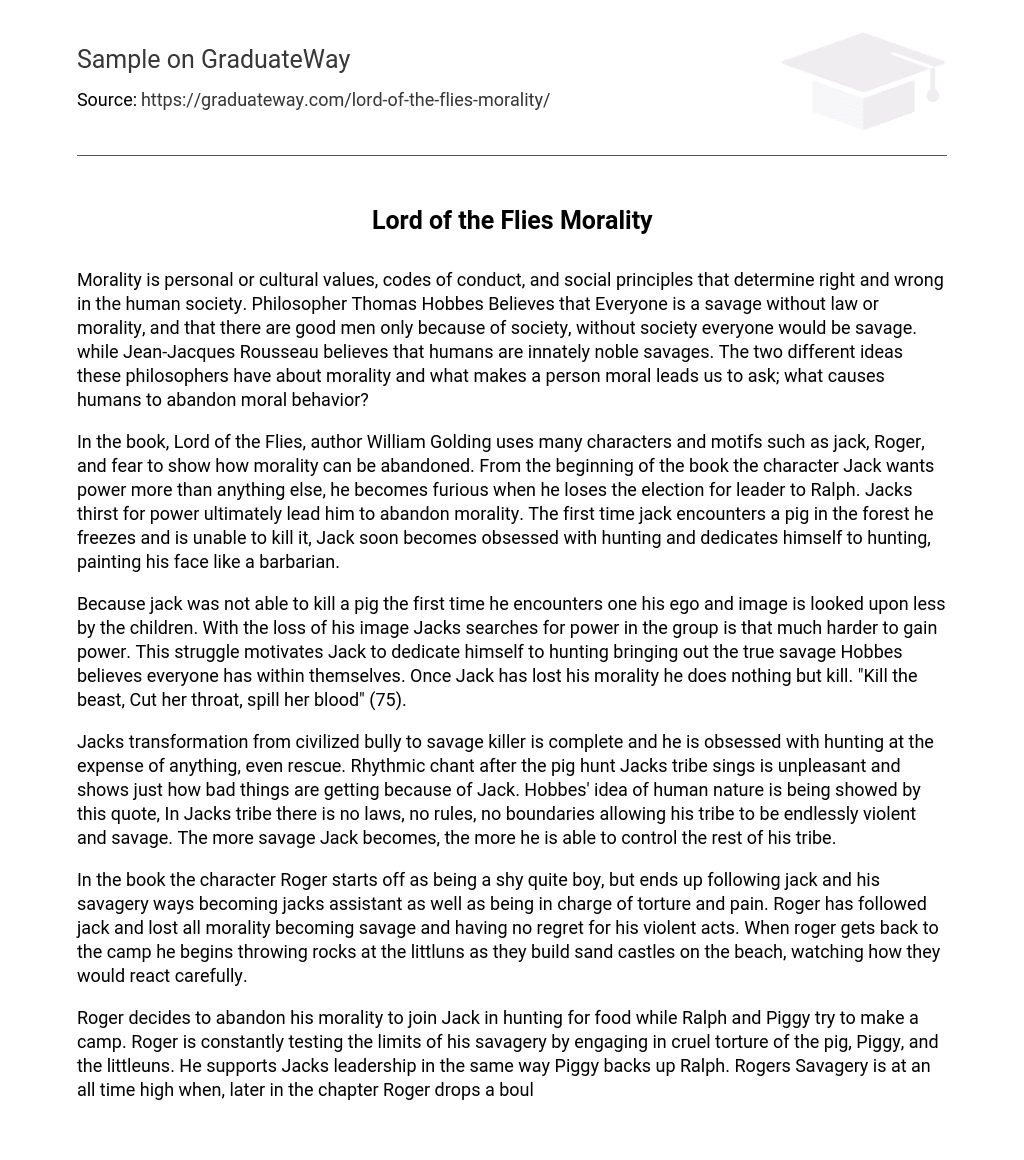Morality encompasses personal or cultural values, codes of conduct, and social principles that dictate the distinction between right and wrong in human society. Philosopher Thomas Hobbes asserts that in the absence of law or morality, individuals descend into savagery, with societal influence being necessary for fostering goodness. In contrast, Jean-Jacques Rousseau posits that humans are inherently noble savages. These conflicting perspectives on morality and its impact on moral behavior lead us to inquire about the motivations behind individuals forsaking ethical behavior.
In the novel Lord of the Flies by William Golding, various characters including Jack and Roger, as well as motifs such as fear, are utilized to illustrate the abandonment of morality. Right from the outset of the story, Jack displays a strong desire for power, which leads to his anger when he loses the leadership election to Ralph. This thirst for power eventually causes Jack to disregard moral principles. Initially, when faced with a pig in the forest, Jack hesitates to kill it. However, he quickly becomes fixated on hunting and fully commits himself to this activity, even adopting a barbaric appearance by painting his face.
Due to Jack’s initial failure in hunting and inability to kill a pig, the children view him with diminished respect and admiration. Consequently, Jack faces greater challenges in his pursuit of power within the group. This difficulty drives Jack to fully devote himself to hunting, revealing the primal instincts that Hobbes believes exist within every individual. Once Jack forsakes his moral compass, he becomes consumed by a relentless desire for bloodshed. As evidenced by his menacing chant, “Kill the beast, Cut her throat, spill her blood” (75).
Jack has fully transformed from a civilized bully to a savage killer, becoming fixated on hunting to the detriment of all else, including rescue. The unsettling rhythmic chant sung by Jack’s tribe after the pig hunt exemplifies the worsening state of affairs under Jack’s influence. This quote demonstrates how Hobbes’ concept of human nature is illustrated within Jack’s tribe, where there are no laws, rules, or boundaries, enabling endless violence and savagery. As Jack grows more savage, his ability to control the rest of his tribe increases.
In the book, Roger is initially portrayed as a shy and quiet boy. However, he gradually embraces Jack’s savage ways and becomes his assistant, responsible for inflicting torture and pain. Roger completely loses his moral compass and shows no remorse for his violent actions. Upon returning to the camp, he starts targeting the littluns by throwing rocks at them while they build sandcastles on the beach, observing their reactions with keen interest.
Roger chooses to disregard his morals and joins Jack in hunting for food, while Ralph and Piggy attempt to establish a camp. Throughout his actions, Roger continuously pushes the boundaries of his savagery by subjecting the pig, Piggy, and the younger children to cruel torture. Similar to how Piggy supports Ralph’s leadership, Roger reinforces Jack’s authority. Ultimately, Roger’s savagery reaches its peak when he callously drops a boulder from castle rock, instantly killing Piggy. Regardless of the immorality or consequences, Roger no longer demonstrates any concern for his actions.
Hobbes’ idea of morality is affirmed by Roger as he displays the inherent savagery within. Additionally, Roger’s presence in a tribe obsessed with killing further bolsters Hobbes’ notion of morality being a social contract. Notably, Roger serves as a pivotal figure in Jack’s tribe, which has forsaken moral behavior. Ultimately, by examining the characters and figures in William Golding’s Lord of the Flies, we can seek to unravel the underlying factors that propel humans to abandon their moral compass.
In the book, we witnessed how Jack’s desire for power led him to become unethical in order to obtain it. This change in Jack had a ripple effect and ultimately resulted in a group of immoral individuals. This newly formed group of savages became dedicated to killing, and it all began with Jack as the catalyst. Can one person truly have the power to corrupt all of humanity? Golding, William. Lord Of the Flies. NY, NY: Putnam Publishing, 1954. Pinker, Steven. The Blank Slate. NY, NY: Penguin Publishing, 2002.





